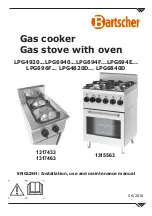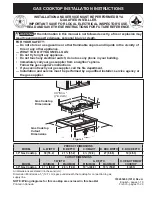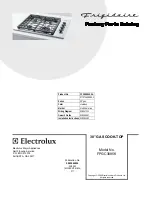
Installation and service must be
performed by a qualified installer,
service agency or gas supplier.
In Massachusetts installation must
be performed by a licensed
plumber/gas fitter.
This appliance must be installed
with its own shut off valve and the
included gas pressure regulator.
Both the valve and the regulator
must be easily accessible to the
consumer to turn on or shut off the
gas supply after the appliance is
installed.
This appliance and its individual
shut off valve must be disconnected
from the gas supply during any
pressure testing of that system
performed in excess of ½ psi
(3.5 kPa). The appliance must be
isolated from the gas supply line by
closing its individual manual shut off
valve at test pressures equal to or
less than ½ psi (3.5 kPa).
Any pipe connections must be
made using a thread sealant
approved for gas connections.
Failure to correctly install these
items could lead to a gas leak and
subsequent explosion.
Leak testing of the appliance shall
be conducted according to the
manufacturer's instructions.
The gas connection must be made
in accordance with local codes or,
in the absence of local codes, with
-
the National Fuel Gas Code,
ANSI Z 21.1 / NFPA 54
for the USA
or
-
the current Can / CGA B 149.1
and .2 Installation Codes for
gas
burning appliances for Canada.
Make sure that the maximum gas
supply pressure before the gas
pressure regulator is never more than
½ psi for both natural gas or LP gas.
The minimum required gas supply
pressure to get the required gas input
is
6" w.c. for natural gas
10" w.c. for LP gas.
Gas connection
36









































